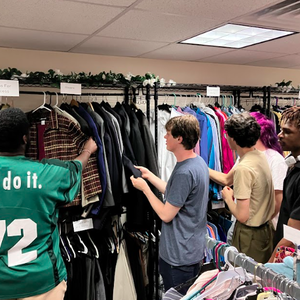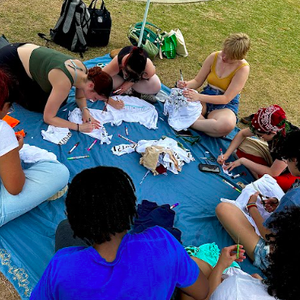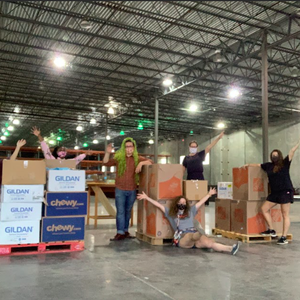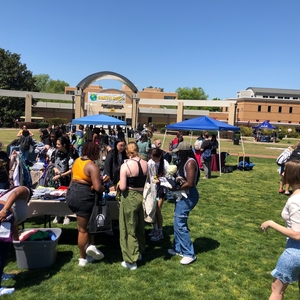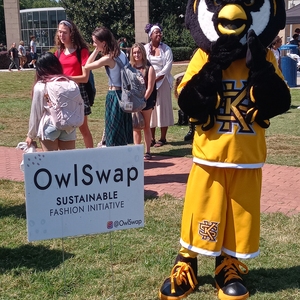OwlSwap– A Social Equity and Environmental Sustainability Textiles and Apparel Initiative at Kennesaw State University
Kennesaw State University
Project Overview
Clothing production is one of the most polluting, resource-intensive industrial processes on the planet. On average, over 80 lbs of textile waste per person ends up in landfills every year, which can then take up to 200 years to decompose. In 2020 the global fashion industry produced 2.1 billion tons of greenhouse gas emissions (McKinsey and Company, 2020). Our clothing purchase habits can result in human rights violations, economic damage, and environmental harm. In addition, garment workers often face dangerous working conditions including poverty wages, long hours, forced overtime, and sexual, physical, and verbal abuse (Labour Behind the Label, 2020). OwlSwap is a sustainability initiative at Kennesaw State University (KSU) that works to address the environmental and social harm caused by the production of clothing and its disposal into landfills by providing a sustainable alternative for its college campus and the external community. OwlSwap is dedicated to addressing apparel-related social equity issues by providing free clothing resources to struggling students. OwlSwap is committed to researching and disseminating important information on the environmental, economic, and social impact of the garment industry.
Background
OwlSwap originally started in the Geography of Clothing course at KSU taught by Dr. Jason Rhodes. Jason and his students launched a collaborative research project with Sociology Professor Shahidur Rahman and students at BRAC University in Dhaka, Bangladesh. Together, students worked to plan interviews with garment workers. After learning about the environment and social ill-effects of fast fashion, KSU students in that initial class decided to find a way to combat it by holding our first ever clothing swap.
Since its inception in 2018, OwlSwap has blossomed from a class project into one of the most active services and sustainability education programs at KSU. Under the leadership of Geography Professor, Dr. Vanessa Slinger-Friedman and a team of Federal Work Study Students, AmeriCorps VISTAs, and volunteers, OwlSwap has expanded to offer a variety of programs that promote environmental and social equity in our community. OwlSwap currently operates two free clothing closets (one on each campus) that are open from Monday to Thursday of every week students, faculty, and staff can simply check in to “shop” in the closets and can choose up to 10 free items each per day. OwlSwap also provides Dress for Success support at all KSU Career Planning and Development Career Fairs. In addition, OwlSwap’s 'pop-up shops' and workshops across campus support many campus organizations. such as Residence Life, the KSU Women’s Resource Center, and the LGBTQ Center, and provide their members with clothing for everyday wear, as well as professional attire for internships, job interviews, and other formal events. While not mandatory, students, faculty, and staff can also donate clothing to the closets. We only ask participants to bring items to swap at the once-a-month swap events. At these events, participants can bring up to 10 items and get tickets to exchange for up to 10 “new to them” items. It is also important to note that the Geography of Clothing course is still being taught by Dr. Rhodes, and the students continue to collaborate with BRAC University students in Bangladesh to support their research on the textile workers who are intricately linked to the clothing we all wear.
Goals
OwlSwap promotes sustainability in textiles and fashion through inclusive events and educational opportunities, builds global engagement through collaborative research, and directly supports our university and the local community through outreach programs and events. We purposefully align OwlSwap’s work to the following United Nations Sustainable Development Goals:
- SDG # 3 Good Health and Well-Being- OwlSwap’s program initiatives all focus on recycling and reusing, which in turn decreases levels of greenhouse gases and landfill pollutants, while simultaneously reducing health risks for local community members.
- SDG # 4 Quality Education- OwlSwap’s work to educate and empower students, faculty, and staff fuels a passion for sustainability and social issues learned in our programs.
- SDG # 5 Gender Equality- OwlSwap promotes gender equality by using inclusive verbiage with all online and in person conversations, campus resources like LGBTQ Center, Women’s resource Center and Office of Victims Services, and globally through our work with women garment workers in Bangladesh.
- SDG # 10 Reduced Inequalities-OwlSwap reduces inequalities by giving a voice to women garment workers in collaboration with BRAC University, providing apparel assistance at no cost to many homeless students throughout the year, and partnering with and supporting LGBTQ + Center and the “TRANScend” closet to offer additional resources to help contribute to a caring campus community for all students.
- SDG #11 Sustainable Cities and Communities- OwlSwap’s programs all help to reduce University waste, and support our community aim to contribute to lasting sustainable cities and communities for now and future generations.
- SDG #12 Responsible consumption and production- OwlSwap began by promoting awareness of the fast fashion industry and its hazards, and now educates campus and community members through innovative educational opportunities like: University Textile Recycling, sustainability focused films and book clubs, clothing swaps and clothing donations that all encourage responsible consumption.
- SDG #17 Partnerships- OwlSwap partners with over 30 different groups, clubs, and other organizations at KSU, along with local nonprofits, to spread awareness of the immediate issue of sustainability and its importance on the world we all live in.
Implementation
In Fall 2017, Kennesaw State University Geography Lecturer Dr. Jason Rhodes and KSU students in the Geography of Clothing course launched a collaborative research project with Sociology Professor Shahidur Rahman and students at BRAC University in Dhaka, Bangladesh. Together, students worked to plan interviews with garment workers. The KSU students taking the Geography of Clothing course were very concerned after learning how the garment industry affects the livelihood of people across the globe and the planet’s environment. They were inspired to organize the first campus clothing swap, which evolved into “OwlSwap”. The OwlSwap events turned into monthly swaps run by student and faculty volunteers, drawing up to 350 participants at one swap in 2019. As the clothing surplus from the swaps grew, another geography professor, Dr. Vanessa Slinger-Friedman, worked with Britt Pickering, one of the students who founded OwlSwap to obtain storage space in the Department of Geography and Anthropology.
Through 2019, OwlSwap’s programming expanded to include an Emergency Care needs collaboration with KSU police department and KSU CAREs (Campus Awareness, Resource & Empowerment Services) for foster, homeless and at-risk students. That year, AmeriCorps VISTA, Britt Pickering and Dr. Jason Rhodes also established the Sustainability Film Series and the Sustainability Book Club. In 2019, KSU changed its logo, making all textiles (tablecloths, banners, etc) with the old logo obsolete. Along with the KSU Office of Sustainability, OwlSwap initiated a textile recycling program where textiles with the old logo were collected from across two campuses. In order to help divert thousands of pounds of these textiles from the landfill, OwlSwap and the Office of Sustainability then spear-headed the laborious process to create a relationship between KSU and re:loom (https://www.reloom.org/), an affordable housing initiative that funds the employment and training of refugees and homeless people (mainly women) through selling upcycled items from donated textiles. The goal of the established relationship is for different departments at KSU to buy back the upcycled textile items from re:Loom to sell or give away as swag to donors.
In 2020, as a reaction to Covid-19 and restrictions on hosting in-person events, OwlSwap created a digital message Instagram account (@owlswapcloset) to allow students, faculty, and staff to view and virtually select free clothing through a social media account and then have a contact-free pick up of the items. A huge milestone was the opening of OwlSwap’s first free clothing closet in 2021, which is now open 4 days a week from 11am - 5pm on KSU’s Kennesaw campus. In 2022, OwlSwap opened its second free campus clothing closet on the Marietta campus in collaboration with KSU’s Career Planning and Development Office. OwlSwap also provides professional clothing at all Career Fairs put on by the Career Planning and Development Office.
Starting in 2020, Dr. Vanessa Slinger-Friedman helped OwlSwap secure one of its most significant resources: paid student labor to staff the closet and help put on OwlSwap events. This has included up to six Federal Work Study Students per semester who can work up to 20 hours/week; one full-time (40-hours/week), year-long AmeriCorps VISTA member; and three 10-week, full-time AmeriCorps Summer Associate Vistas. In addition, OwlSwap typically provides 1-2 internships to KSU college students per semester.
In 2021, OwlSwap was approached by Cobb County’s (GA) SETS (Students Exploring Transition Services) Program and asked to be a site for their student interns. These are students with disabilities who have graduated from high school but who are not ready to enter the workforce. The works sites offer on-campus internships for the students to build employment skills and independence. Evidence of the effectiveness of OwlSwap as a SETS work site is in the feedback from Katie Ennis, their teacher, who said, “OwlSwap has provided a multitude of opportunities for my students to learn valuable skills to carry into their future jobs/careers... Owl Swap has led to a wonderful success story within just the past year. A SETS student moved from her internship in the Owl Swap into a retail job.”
Over time, OwlSwap’s partnership with campus community members has increased to include groups like Residence Life, academic departments, classes, and the Student Activities Center. OwlSwap also provides mending workshops, and ‘Pop up shops’ with free professional and everyday wear for these groups and many others across campus. OwlSwap has also been able to increase clothing assistance to external partners including Hope Thru Soap (https://hopethrusoap.org/), MUST ministries, re:Loom, and the Beloved Community Church, all who serve residents in poverty, refugees, and the homeless community in the metro Atlanta area.
Timeline
TImeline of OwlSwap to date:
2017 - Students in a Geography of Clothing course at KSU learning about the environmental and social issues associated with the textile industry were inspired to host a campus clothing swap (subsequently called an “OwlSwap” after the Owl university mascot).
2018 - 2019 – Monthly OwlSwap swap events continued, growing up to 350 participants, and volunteers worked to obtain storage space in the Department of Geography & Anthropology to accommodate surplus clothing between swaps. 2019 - Launched Emergency care needs (collaboration with KSU PD and CARE) for homeless and at-risk students to obtain clothing and bedding needs.
2019 – KSU changed its logo, making all textiles (tablecloths, banners, etc) with the old logo obsolete. Along with the KSU Office of Sustainability, OwlSwap initiated a textile recycling program where textiles with the old logo were collected from across two campuses and then to put into place a relationship between KSU and re:loom (https://www.reloom.org/ - an affordable housing initiative that funds its employment training program through selling upcycled items from donated textiles) to divert thousands of pounds of textiles with the old KSU logo from landfill.
2019/2020 – Established the Sustainability Book Club and virtual Sustainability Film series in response to social distancing due to Covid-19.
2020 OwlSwap started hiring federal work study students, 1 year-long AmeriCorps VISTA, 3 AmeriCorps Summer Associate VISTAs, and providing 1-2 student internships every semester.
2020 – As a reaction to Covid-19 and restrictions on hosting in-person events, OwlSwap created a digital message Instagram account (@owlswapcloset) for students, faculty, and staff to be able to view and virtually select free clothing through a social media account and then have contact-free pick up of items.
2021 – First Free OwlSwap Closet launched on KSU’s Kennesaw campus. Staffed by Federal Work Study Students, the closet is now open 4-5 days weekly. OwlSwap also started hosting mending workshops.
2021 – Collaboration with Cobb County Schools to have SET (Student Engaged in Transition) Interns work in the OwlSwap Closet.
2022 – OwlSwap opened its second free campus clothing closet on the Marietta campus, a collaboration with KSU’s Career Planning and Development Office.
2022 – OwlSwap collaborated with campus community members. including Residence Life, academic departments, the Student Activities Center, and other groups to provide ‘Pop up shops’ with free professional and everyday wear for their members.
2022 – OwlSwap provides external partners such as Hope Thru Soap, MUST ministries, and Beloved Community Church with clothing items for their members.
2023 – OwlSwap continues to grow in its impact as it increases its engagement with the campus and external communities.
Financing
**Years 1-2: Starting up with Clothing Swaps **
In the initial years, the startup costs of this initiative were very low. It was supported by very enthusiastic and motivated student and faculty volunteers. We relied on donations of free clothing, and we got the support of a local thrifting and vintage store, Ecologie Vintage & Resale, who lent OwlSwap the racks to host the first year of clothing swaps. The university also provided the space for the clothing swap events for free. After the first year, very minimal funding of $300) was provided by the KSU Department of Geography and Anthropology to support purchasing signage and storage bins for the clothes. This was supplemented by a $500 annual donation from Ecologie Vintage and Resale, which allowed us to buy one or two multilevel storage racks for the clothing bins in between clothing swaps.
Years 3 and beyond: Creating Closets and Expanding Services
With some persistence, OwlSwap was able to secure a closet space of roughly 225 square feet on the Kennesaw campus. The recurring $500 annual donation and an additional $750 from the Department of Geography and Anthropology have been used to buy supplies, such as the rolling racks used for the monthly clothing swaps and multi-tiered clothing organizers to place items in the closet. Since October of 2020. we have had 24,913 clothing items donated valued at $167,136.77. This has allowed OwlSwap to stock two free campus closets for the campus community and provide clothing for external partners who provide these resources for their clients and community members, including people who are in poverty, refugees or experiencing homelessness.
While the volunteerism associated with the birth of OwlSwap was wonderful, the reality is that the commitment of student organizations (RSOs) can ebb and wain over time, thus making it a challenge to provide consistent services and continued growth. Additionally, someone is always needed to coordinate and oversee volunteers and staff working for OwlSwap. For this reason, the addition of paid labor in its third year has been invaluable in helping OwlSwap continue to expand its operations. This labor force comes in the form of five federal work study positions through the KSU Office of Financial Aid (roughly $2,500 per student per semester); a year-long full-time AmeriCorps VISTA (approximate value at $20,000/year), three AmeriCorps Summer Associate Vista positions (10-week, full-time positions in June-July); and the SETs Interns from the neighboring county school district (2 interns/semester working for about 5 hours/day for 4 days/week)). OwlSwap’s educational programming and social media presence has also been done at minimal expense, with federal work study students, AmeriCorps Vistas, and Interns completing academic credit providing the labor to do research and write papers, Instagram posts and stories.
Results
OwlSwap Outcomes
Environmental Sustainability OwlSwap has grown into a university-wide initiative supporting and intensively engaging KSU students, faculty, and staff, and the external community. Accepting donations of gently worn clothing and then making them available for free to all of these stakeholders extends the life of existing clothing items, thus reducing the use of resources to produce new items and the associated water, air, and soil pollution generated from the clothing industry. Since October 2020, OwlSwap has received 22,340 donated items and since January 2021, we have swapped out 9,316 items and provided 4,898 items to external partners. We estimate that just between November 2020 and June 2022, OwlSwap collected 2,089.81 lbs of university textiles for upcycling. Between August 2020 and June 2022, OwlSwap has saved nearly 40,000 gallons of water by repurposing shirts for our Apparel Assistance program (https://online.fliphtml5.com/ecyhy/sjng/#p=1).**
Promoting Social Equity and Sustainability OwlSwap also promotes social sustainability for KSU’s internal and external community members who are in need. Since 2018 2,530 people have attended swaps, and since 2021 1,812 people have used our on-campus closets. The clothing swaps and closets are engaging more and more students, staff, and faculty every semester. OwlSwap not only helps students who lack financial resources and may struggle to obtain clothing for everyday wear, it also provides professional attire for internship and job interviews and other formal events. The value of the items given out from our campus closet since 2021 have been valued at $73,834.12. Our Dress for Success programs, which include collaborating with Career Planning and Development at the Career Fairs on both campuses, attempt to level the playing field for these students by allowing them to show up to Career Fairs professionally dressed to meet with prospective employers. We have a significant positive impact at the Career Fairs as indicated in communication from Sheri Blight, Assistant Director, Career Planning & Development:
“Our Job Fairs require business casual or business professional dress and sometimes that means respectfully turning students away if they don't meet those requirements. Starting Spring '22, we have been working with the OwlSwap Clothing Closet to have professional dress items available at our job fairs for students to wear…Due to this partnership effort, we have not needed to turn away a single student this semester - every single under-dressed student was able to find clothing to wear at the Clothing Closet for our job fairs! That is not an easy feat when some job fairs like our recent STEM Job Fair saw almost 1900 students across 2 days in September.”
OwlSwap redirected clothing items to provide 4,898 items valued at $29,944.79 to external partners such as MUST ministries, Beloved Community Church in Pittsburg, Atlanta, and Hope Thru Soap, who provide homeless people with a mobile shower and opportunity to select clothing.
Education, Awareness, and Engagement for Sustainability OwlSwap provides experiential learning and employment opportunities through AmeriCorps VISTA, the Federal Work Study Program, class lectures, volunteering opportunities, and academic internships. The OwlSwap team members are involved in the everyday operations and also programming and educational efforts through our social media. In May 2023, OwlSwap was reaching over 2400 Instagram followers at or around KSU, metro Atlanta, and the broader national and international communities, and the team has posted almost 850 Instagram posts providing education and awareness about sustainable fashion, and environmental and social equity in the apparels and textile industry. We also achieved almost 900 followers on our virtual closet @owlswapcloset Instagram (virtual closet). Currently, over 850 recipients are on the OwlSwap newsletter mailing list to get this monthly newsletter.
Ground breaking - Innovative and Replicated Research recently completed on clothing closet resources at Universities across the United States indicates that the OwlSwap Initiative is innovative and unique in its scope (Colantuono, 2023). The research found that most university textile resources in the US are limited to dress for success professional wear programs and only allow students to obtain one professional outfit per semester (Colantuono, 2023). While OwlSwap encourages participants to be thoughtful and to not over-consume, its closets allow students, staff, and faculty to access all clothing needed for professional and daily wear four days a week for most of the year with the goal of making clothes affordable and reducing any barriers to success for community members who may be struggling.
The OwlSwap closet has already been replicated in the form of a second clothing closet on the sister KSU Marietta campus. The Career Planning and Development Office gave OwlSwap its space to create a second OwlSwap closet to help promote the Dress for Success program for students attending the Career Fairs. Additionally, the OwlSwap closet inspired and supplied clothing items for a LGBTQ closet at KSU. Further afield, OwlSwap is a leader and groundbreaker in the area of sustainability and social equity in fashion and textiles at a university. As a result, we have been approached by several other educational institutions to provide mentorship for their efforts in this area. For instance, in Fall 2022 we met with a KSU alumni who is now a student at Georgia State University to talk with her about starting a clothing swap on their campus; a student at the University of North Georgia who is looking to start a professional closet swap, and the Sustainability Coordinator in the Office of Leadership and Service at the University of Missouri -Columbia, who oversees a sustainability program as well as a professional clothing closet. She was seeking mentorship on successes with programming, managing clothing bin drop offs and recycling, as well as volunteer management.
Lessons Learned
Here are two key lessons that we can share related to creating a sustainability initiative related to textiles and apparels on a University campus:
Donations will be plentiful! The number of donated items will far exceed the number of items that people take back, as a result it is necessary to have a large storage space for surplus clothing, as well as strong relationships with outside organizations who can also benefit from the clothing donations. Strong advertising, participation in campus events, creativity and social media are all ways to help get the word out about the program and get people using the resource.
Grow to suit the needs of your community and as you can accommodate it! Do not try to implement a large scale textile program with all the programming elements that can currently be found associated with KSU’s OwlSwap all at one time. That took us years to do. Build a clothing recycling program that fits your needs and available resources (especially labor supply) and let it develop intentionally along with your resources.
References Cited
Colantuono, L., (2023). “Universities in the United States Providing Different Clothing Based Resources to the Student Body” Kennesaw Journal of Undergraduate Research (KJUR). Submitted May 2023. Under review.
Labour Behind the Label, (2023). Living Wage: A wage that covers a workers' basic needs is a human right. https://labourbehindthelabel.org/campaigns/living-wage/.
McKinsey and Company, (2020). Fashion on Climate, how the fashion industry can urgently act to reduce its greenhouse emissions. https://www.mckinsey.com/~/media/McKinsey/Industries/Retail/Our%20Insights/Fashion%20on%20climate/Fashion-on-climate-Full-report.pdf.
OwlSwap, (2022). OwlSwap Year in Review. https://online.fliphtml5.com/ecyhy/sjng/#p=1.

